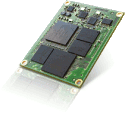ARM9 SOM ships with Linux dev kit
Feb 26, 2009 — by Eric Brown — from the LinuxDevices Archive — 21 views Armadeus Systems is shipping a low-cost system-on-module (SOM), available with a development board and a Linux community distribution. The “APF27” is built around an ARM9 Freescale i.MX27 system-on-chip (SoC) and a Xilinx Spartan3A FPGA, and offers a variety of I/O, says the French embedded firm.
Armadeus Systems is shipping a low-cost system-on-module (SOM), available with a development board and a Linux community distribution. The “APF27” is built around an ARM9 Freescale i.MX27 system-on-chip (SoC) and a Xilinx Spartan3A FPGA, and offers a variety of I/O, says the French embedded firm.
(Click for larger view of the Armadeus APF27)
The APF27 — together with a customer-designed baseboard — can serve a range of low-cost mobile and low-power applications, says Armadeus. The module is claimed to be the only available processor module with an i.MX27 processor, FPGA, and low-cost 16-bit NAND.
The APF27 uses Freescale's i.MX27 SoC, which like the earlier i.MX21, is based on an ARM926EJ-S core clocked at 400MHz. Built on 90nm technology, the i.MX27 added on-chip video acceleration, more storage interfaces, and a 10/100 Ethernet port, compared to the i.MX21 design.
The APF27 is available in 64MB or 128MB mobile DDR-RAM versions, and both offer 128MB flash standard, upgradable to 512MB. The i.MX27 is paired with a Xilinx Spartan3a FPGA (field programmable gate array) with 200,000 or 400,000 gates.
The APF27 is equipped with a variety of interfaces, including Ethernet, USB, SPI, SD, and video I/O. There's also an RS232 serial connection, reducing the need for an external debugger, the company says. The 2.4 x 1.9-inch module runs on 3.3V, and offers a fairly wide temperature range, up to 167 degrees F.
Specifications listed for the APF27 include:
- CPU– Freescale i.MX27 400MHz
- FPGA — Xilinx Spartan3A FPGA (200 or 400K gates)
- Memory — 64MB to 128MB mobile DDR-RAM (32-bit, 266MHz)
- Flash — 128MB to 512MB Mobile NAND Flash (16-bit); 64KB E2PROM (I2C)
- Networking — 1 x 10/100 Ethernet with low power transceiver
- USB — 1 x USB 1.1 Host; 1 x USB 2.0 OTG (PHY onboard)
- Video I/O — 8/10-bit video input port supporting YUV4:2:2, CCIR656, and
standard CMOS sensors - Other I/O (available on two Hirose connectors):
- 2 x UARTs with RS232 levels (RX/TX)
- 3 x UARTS with TTL levels (RTS/CTS/TX/RX)
- 2 x SPI
- 2 x SSI
- 2 x I2C
- 2 x SD/MMC controller
- More than 90 GPIOs (shared with peripherals)
- Other features — “no power” freeze mode; 15 LVDS pairs, 32 high current outputs or 62 GPIOs
- Power — +3.3V < 1W ( suspend to DDR mode) or < 20mW (with Ethernet and USB tranceivers)
- Dimensions — 2.4 x 1.9 inches (61 x 48 mm)
- Operating temperature — -4 to 167 deg. F (-20 to 75 deg. C)
- Operating system — Linux 2.6.27 with U-Boot 1.3.4
APF27 Dev board
The APF27 Dev development platform appears to be something of a work in progress, as no photo is available, and several key features are said to be “coming soon.” It appears that the Lite version is available now, but the Full version with additional wireless radios and HDMI support is not yet ready.
The APF27 Dev board is said to offer the following features:
- Touchscreen controller
- Audio in/out controller
- 10-bit ADC and DAC
- CAN bus
- Real-time clock with battery backup
- Connectors:
- Power supply
- 2 x USB Host
- 1 x microSD
- 1 x Ethernet
- 1 x TFT LCD (with touchscreen)
- 1 x stereo audio OUT
- 1 x mono audio IN
- 1 x RS232 debug (for console/debug)
- 3 x UARTS (one 4-wire TTL, two 2-wire TTL)
- 2 x SPI
- 2 x SSI
- 2 x I2C
- FPGA I/Os
- Coming soon: HDMI output; GSM/GPRS modem; WiFi b/g/I; GPS Galileo receiver
The development board ships with a development kit based on a U-Boot and Linux 2.6.27 buildroot distribution that is maintained by the Armadeus.org community sponsored by Armadeus Systems. For FPGA development, developers can use the freely available Xilinx Webkit, as well as an Armadeus “Peripheral On Demand” open-source front end, which the company says eases the integration of Wishbone's compatible OpenCores IP. Armadeus says it can provide custom and “lower cost” designs in quantities, and can design custom systems, from low-level drivers to a sophisticated Qt-based GUI.
Availability
The APF27 is available now for 125.40 Euros (about $160 US) for the 64MB-DDR version and 144 Euros ($184 US) for the 128MB version. The Lite version of the development board kit, presumably without the APF27 itself, costs 152.50 Euros ($195 US). All products should be available for sale, here.
More information on the Armadeus APF27 may be found here. More on the APF27 development board may be found here.
This article was originally published on LinuxDevices.com and has been donated to the open source community by QuinStreet Inc. Please visit LinuxToday.com for up-to-date news and articles about Linux and open source.